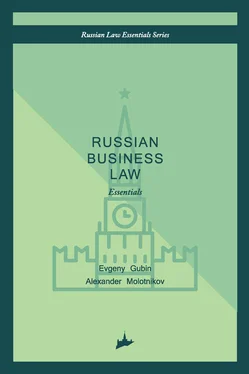Evgeny Gubin - Russian business law - the essentials
Здесь есть возможность читать онлайн «Evgeny Gubin - Russian business law - the essentials» — ознакомительный отрывок электронной книги совершенно бесплатно, а после прочтения отрывка купить полную версию. В некоторых случаях можно слушать аудио, скачать через торрент в формате fb2 и присутствует краткое содержание. Город: Moscow, Год выпуска: 2016, ISBN: 2016, Жанр: foreign_language, Юриспруденция, popular_business, на английском языке. Описание произведения, (предисловие) а так же отзывы посетителей доступны на портале библиотеки ЛибКат.
- Название:Russian business law: the essentials
- Автор:
- Жанр:
- Год:2016
- Город:Moscow
- ISBN:978-5-9904334-9-6
- Рейтинг книги:3 / 5. Голосов: 1
-
Избранное:Добавить в избранное
- Отзывы:
-
Ваша оценка:
- 60
- 1
- 2
- 3
- 4
- 5
Russian business law: the essentials: краткое содержание, описание и аннотация
Предлагаем к чтению аннотацию, описание, краткое содержание или предисловие (зависит от того, что написал сам автор книги «Russian business law: the essentials»). Если вы не нашли необходимую информацию о книге — напишите в комментариях, мы постараемся отыскать её.
Russian business law: the essentials — читать онлайн ознакомительный отрывок
Ниже представлен текст книги, разбитый по страницам. Система сохранения места последней прочитанной страницы, позволяет с удобством читать онлайн бесплатно книгу «Russian business law: the essentials», без необходимости каждый раз заново искать на чём Вы остановились. Поставьте закладку, и сможете в любой момент перейти на страницу, на которой закончили чтение.
Интервал:
Закладка:
The book is rich in examples that support my enthusiasm. For example, the overview of business legislation chapter successfully guides the reader through how Russia’s Continental legal tradition is driven by statutes and how these statutes are assembled as a hierarchy reflecting the principles of law at the federal level and, then, the regional level. The authors describe the system for originating, testing and promulgating law in a way that suggests society-wide consideration of the principles and their application. Enlightening to me is the discussion of the Constitutional basis for the oversight, and essentially promotion, of entrepreneurship. Few countries originate sets of laws out of specific consideration of the need to drive entrepreneurial activity by providing a set of statutes to serve as a guide on the one hand, and a set of assurances on the other. In fact, Russian law assembles in definable provisions a suite of identifiable statutes addressing a vast array of circumstances and possibilities.
It appears to me as a foreigner that Russia has successfully sought to leapfrog its system of commercially related laws through careful study, analysis and adoption of the experiences of countries under the Continental legal tradition, as well as the British-American tradition. As such, while there are specific differences, foreign business people will find the underpinnings of modern Russian law intuitive with respect to the traditions of their native countries. This is not to suggest that there are not differences, but to assure readers that there is an internal logic to Russian law that is rooted in the practical experiences of countries with longer capitalist heritages.
As a practical guide, the book provides the information necessary to distinguish the individual and entities with legal standing. In addition, the book provides a comprehensive view of the available legal structures for profit and nonprofit organizations in detail that is sufficient for the lay reader to understand the options, and discuss these knowledgeably with competent legal counsel. Attorneys tell us that the best clients are informed clients. With respect to the choice of entity, any reader will be an informed reader and can make the most of their relationship with legal counsel.
I found the discussion of Russian Securities Laws and Regulations particularly enlightening. Here again, it is obvious that modern Russian law has leapfrogged over a century’s worth of missteps in the evolution and enforcement of securities laws in other countries. It has done so for a wide-variety of financial instruments and products. While Russia has its own complexities and special requirements in this arena, the book presents the overall structure in an understandable way that inspires confidence. There is a clear message that there are severe penalties for stepping outside the regulations. From that I infer that the Russian government is serious about building and maintaining confidence in its capital markets.
The book also offers a concise but thorough discussion of the Constitutional basis for litigation, arbitration and other means of legal protection. In any jurisdiction, this aspect of law represents a maze of due process and procedure that is mastered only by the most dedicated and diligent legal practitioner. Here again, however, the notion that the best client is an informed client applies.
This chapter should be read and digested by any business person contemplating commercial activity in Russia as a means of deriving confidence in the Russian legal system on the one hand, and as a guide for enhancing their negotiation of business terms in a contract. Too often, business people will leave the legal provisions to attorneys without taking the time to arm themselves with insights that will allow them to craft an investment or business relationship that considers the universe of issues. The book’s accessible treatment of protections is a must read for anyone venturing in Russia or into Russia for the first time.
Finally, in every jurisdiction in every country, whether national, regional or local, there are principles of contract law that have their own nuances when applied in negotiation, commercial activity and adjudication. While these are, again, the province of a dedicated jurist, the book provides a valuable oversight into the realities of contract law in Russia and in so doing, arms the lay reader with the information and insights necessary to structure the most satisfactory investment or commercial relationship.
As I said in my opening paragraph, Levon Garslian and Professors Gubin and Molotnikov have done me a great service. Now when I am asked about the rule of business law in Russia, I can honestly reply “Read Russian Business Law: The Essentials ” and you will have your answer.
Stephen M. Sammut, Senior Fellow, Health Care Management Lecturer, Entrepreneurship Wharton School, University of Pennsylvania, December 20, 2015Preface
“You will not grasp her with your mind
Or cover with a common label,
For Russia is one of a kind —
Believe in her, if you are able…” [1] Translated by Anatoly Liberman, available at http://www.ruthenia.ru/tiutchevi-ana/publications/trans/umomrossiju.html#en.
[2] Fyodor Ivanovich Tyutchev (Russian: Фёдор Иванович Тютчев; December 5, 1803 – July 27, 1873) is generally considered the last of three great Romantic poets of Russia, following Alexander Pushkin and Mikhail Lermontov. See https://en.wikipedia.org/wiki/Fyodor_Tyutchev.(November 28, 1866)
These insightful and, in some way, mysterious words, written by F. Tyutchev almost more than 150 years ago, could be also applied today to various spheres of the Russian life. This could even be applied to the way we do business or so-called “entrepreneurship.” Furthermore, it seems that one could have such a perception not only in relation to doing business, but also the law around it. Our attempt here is to show that this is not the case. Certainly, Russian law, especially business law, could hardly be covered “with a common label;” if anything related to Russia could be done so at all. However, you can definitely “grasp” the Russian business law “with your mind,” at a high-level, even without having a legal background. Our main goal is to help you to achieve such an understanding.
The study of business law is an essential requirement for a business lawyer, businesspersons (including managers and entrepreneurs), as well as for academics. Consider this – what would you do if (1) your client or company has a legal issue in Russia, or (2) you want to tell your students about recent law developments in business transactions in Russia, or (3) you are simply interested in learning about the new Russian law system regulating business relations and conditions of the market economy? Whom would you ask, or where would you look up first? Answers may vary according to the situation: one could hire a law firm, call a friend, or just “google” it. However, it would be much more convenient to have something to use that is reliable, concise, and comprehensive. The absence of a helpful resource in English encouraged our team mainly of professors, PhD students, and graduates of the Lomonosov Moscow State University Business Law Department to prepare this book, which tells about the regulation of business in Russia. However, one should not consider that its main purpose is to simply retell the content of legal acts related to the regulation of business relations. Our team strove to resolve a much more complex problem: on the one hand, to show in what way particular areas of business are regulated, and on the other, to define the fundamentals of business regulation in Russia.
Читать дальшеИнтервал:
Закладка:
Похожие книги на «Russian business law: the essentials»
Представляем Вашему вниманию похожие книги на «Russian business law: the essentials» списком для выбора. Мы отобрали схожую по названию и смыслу литературу в надежде предоставить читателям больше вариантов отыскать новые, интересные, ещё непрочитанные произведения.
Обсуждение, отзывы о книге «Russian business law: the essentials» и просто собственные мнения читателей. Оставьте ваши комментарии, напишите, что Вы думаете о произведении, его смысле или главных героях. Укажите что конкретно понравилось, а что нет, и почему Вы так считаете.












